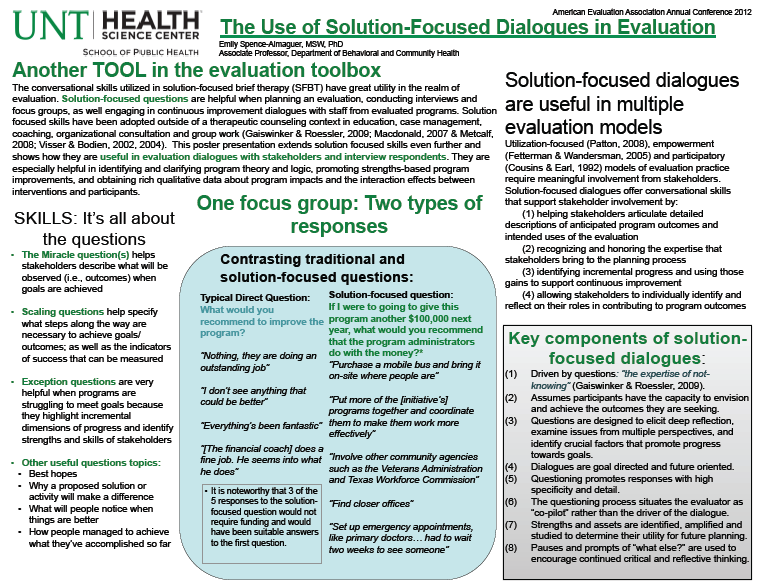My name is Emily Spence-Almaguer and I am an Associate Professor of Behavioral and Community Health at the University of North Texas Health Science Center. I spend most of my professional time serving as an independent evaluator for community initiatives and conducting assessment studies. I am a social worker by training and have found that the conversational skills used in Solution-Focused Therapy have great application in the realm of evaluation and community assessment.
Hot Tips: My favorite ways to use solution-focused dialogues are in:
- Focus group and individual interviews because they help generate rich qualitative data and great ideas for continuous program improvements.
- Evaluation planning meetings because they help stakeholders articulate a wide range of potential outcomes and describe how those outcomes might be observed (i.e., measured).
- Meetings where stakeholders are being debriefed around disappointing evaluation results. The nature of solution-focused dialogues avoids finger-pointing and helps drive forward momentum.
Hot Tips:
- It’s all about the questions!! Solution-focused dialogues are driven by questions that promote deep reflection and critical thinking.
- Context: Use questions that help situate people’s minds in a particular context and use details in your question that will encourage an individual to imagine him or herself in that moment. Here’s an example that I use with consumers at a program trying to help lift individuals and families out of poverty:
- I want you to take a moment and imagine that you just learned that the Bass [local philanthropist] family recently donated $100,000 to the United Way for this project. They want you to help them figure out how to best spend the money. What is the first thing you would advise them to do? What would you advise them to do next?
- Expertise: I love the way that Gaiswinker and Roessler referred to this as the “expertise of not-knowing”. In solution-focused dialogues the words of questions and tone of delivery are carefully crafted to amplify the assumption that the stakeholders have exceptional knowledge, skills and capacities.
Rad Resource: For an introduction to solution focused concepts, I like Coert Visser’s Doing What Works Blog.

Rad Resource: I presented on Solution-Focused dialogues in evaluation at AEA’s Evaluation 2012 conference. You can download my poster and resources list from the AEA public eLibrary here.
Lessons Learned: A direct question, such as “What would you recommend to improve this program?” often fails to generate detailed or meaningful responses. In focus groups with program consumers, I find that this question is interpreted as “what is wrong with the program?” and may lead to comments in defense of the program staff members (see my 2012 AEA poster for an example of this from my data).
Do you have questions, concerns, kudos, or content to extend this aea365 contribution? Please add them in the comments section for this post on the aea365 webpage so that we may enrich our community of practice. Would you like to submit an aea365 Tip? Please send a note of interest to aea365@eval.org. aea365 is sponsored by the American Evaluation Association and provides a Tip-a-Day by and for evaluators.

Hi Emily,
I am a student enrolled in the Master of Education program at Queens University. I am taking a course on program evaluation and found your article very informative. I enjoyed reading your insightful post on Solution-Focused Therapy as you reflect on the importance of asking solution-based questions to enhance the success and sustainability of a program. You discuss how asking students a simple question on ‘how a program can be improved” often ends up being misinterpreted (Spence-Almaguer, 2013. A reason being is because by the time students have reached the desired outcome or program goal, they may feel that no improvement is required. This becomes problematic as a program may not reach its full potential. You emphasize the importance of rephrasing questions in a way where input will be provided. Questions such as “what would you wish to see next time” or “if you could alter something about the program what would it be?” are great for starters. Solution-focused dialogues are appropriate for program evaluations as they are driven by questions that promote deep reflection and critical thinking (Spence-Almaguer, 2013). I never realized the importance questioning and using adequate wording to receive meaningful responses from the targeted audience. One of my takeaways from your article is to be clear, concise, and direct about the questions you ask so that you individuals can reflect and respond with specific ideas that can enhance the program goals. Lastly, I appreciate how you incorporated a visual poster that provides a better sense on what Solution-Focused Dialogue may look like. The poster provides examples of various types of questions such as “miracle, scaling and exception” questions that can be asked as well as a table that differentiates between traditional and solution-focused questions.
Thank you for sharing a handful of knowledge around Solution-Focused Dialogue and its benefits towards program evaluation!
Jaspreet
Emily, what a great post! I am familiar with solution focused brief therapy as many of my colleagues at a school district are social workers, counselors, and psychologists. However, I would never have made this wonderful connection between it and evaluation. I love the idea of framing the questions in such a way as to elicit richer answers. I would not have thought twice about asking “What do you think would improve this program?”…until now. 🙂 Thanks for some great ideas.
Emily,
I love this! I hadn’t heard of solution-focused discussions before and the framing rings so true. I appreciate the focus on elevating and celebrating the expertise of those in the group and also the de-emphasis on what is wrong. I prefer to dream big and work backwards to what is feasible. This is just a quick thank you for sharing.